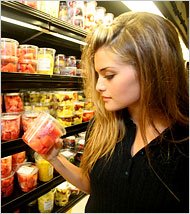
OK, so I'm slightly frightened by this article about Daphne Oz, a "self-described former chubby girl made cute" who's written a book about how not to be fat while in college. Her qualifications include, well, her father's a doctor, she goes to Princeton (where she doesn't study anything health or biology-related), and she wrote a high school research paper on how not to be fat. As one of the huddled masses who wishes she'd written a book on a popular subject, part of me is jealous that I didn't come up with the idea of telling undergrads how to stay slim. How hard could that be? In a sense, I did write such a guide, although not one likely to put me in the Styles section. But so what if the truth is that the skinny kids in college are like that because of a combination of good genes and good drugs, or just a preponderance of bad food on campus? Everyone likes a book that tells you you're just a few baby carrots away from Kate Mossness.
I must say, the book's philosophy doesn't sound all that appealing. Natasha Singer writes:
"Ms. Oz’s own metamorphosis — from an unconscious consumer of white bread, bagels and 'huge plates of pasta' to an alert eater who views food purely as fuel — forms the backbone of the book."
As a consumer of huge plates of pasta, I must protest. And as a Francophile, I of course object to the idea that the best way to get through life is to view food as fuel. (insert gravelly French accent starting now). Shall we view sex purely as a means to reproduce? Shall we view fashion purely as a means to stay warm in winter and shaded in summer? (remove French accent and return to whatever accent you usually have when reading English). It's just a depressing way to go through life.
Singer goes on to tell about more about Oz's diet guide:
"For all its well-intentioned talk of good eating habits, however, the book does occasionally equate fat not only with unhealthiness but also with unattractiveness."
If the main thing qualifying Oz to write this book is that she's gone from fat to attractive, it's safe to assume her book would take as a given that being fat is not... attractive. But this part of the book can't really be faulted-- what else is supposed to be college students' motivation for losing weight?
The good news? Attending NYU is listed as a contributing factor in being thin and fabulous.
Thursday, August 31, 2006
But watermelon is so fattening!
Posted by
Phoebe Maltz Bovy
at
Thursday, August 31, 2006
![]()
Subscribe to:
Post Comments (Atom)

6 comments:
She looks pretty scary in that photo. I wonder if that's a side effect of snacking on bittersweet chocolate pieces, which I previously assumed could only be rendered edible when incorporated into sugary (and fattening!) baked goods.
It depends-- bittersweet, as in, not much sugar, can be quite tasty. Totally unsweetened is bad news. I'd say she looks more intimidating than scary, a subtle but key difference.
I always found it strange to find bittersweet Lindt chocolate bars (70-80% cocoa) in the baking sections of American supermarkets. In European supermarkets these are invariably in the "edible" chocolates section. In fact I find bittersweet chocolate much more edible than the bland monstrosity that passes for milk chocolate here. You have to surpass 85% cocoa content for it to turn really inedible.
Watermelon is a negative-calorie food. On the contrary, the more you eat, the more calories you will burn.
Ok, so I am really confused on this topic...is watermelon fattening????
You sound so jealous. It's hilarious.
Post a Comment